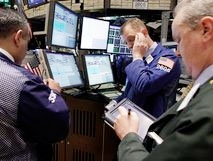European stocks, euro rise on growth figures
 Eurostat, the EU's statistics office, said the economy of the 17 countries that use the euro grew by a quarterly rate of 0.8 per cent in the first three months of the year. That was more than double the 0.3 per cent growth posted in the previous three-month period and ahead of analysts' expectations for a 0.6 per cent increase. The eurozone also grew at double the rate of the U.S.
Eurostat, the EU's statistics office, said the economy of the 17 countries that use the euro grew by a quarterly rate of 0.8 per cent in the first three months of the year. That was more than double the 0.3 per cent growth posted in the previous three-month period and ahead of analysts' expectations for a 0.6 per cent increase. The eurozone also grew at double the rate of the U.S.
The outperformance was largely due to another stellar performance from Germany, which posted forecast-busting growth of 1.5 per cent during the quarter. France, the eurozone's second largest economy, enjoyed strong growth of 1 per cent and even debt-imperilled Greece saw its economy grow by 0.8 per cent, though that was largely due to a rebound from a bigger than anticipated contraction in the previous quarter.
The improving picture was not uniform, though, as Portugal dropped back into recession after shrinking for the second straight quarter. Last month, Portugal became the eurozone's third member after Greece and Ireland to request a financial bailout from its partners in the eurozone and the International Monetary Fund. Growth figures for Ireland are not yet available.
As a result, Portugal's main PSI underperformed its peers in Europe, trading only 0.1 per cent higher, compared with a 0.4 per cent rise in the main Athens index. In the larger markets, Germany's DAX rose 0.2 per cent to 7,496 while the CAC-40 in France rose 0.5 per cent to 4,043. The FTSE 100 index of leading British shares was up 0.7 per cent tat 5,989.
Meanwhile, the euro was trading 0.4 per cent higher at $1.4291, having traded as far as $1.4338 earlier.
The growth figures proved a welcome relief to the euro, which had lost about 8 cents to the dollar this week as investors scaled back expectations of interest rate increases by the European Central Bank and worried about Greece's debt troubles. Last week, it was near 18-months high above $1.49.
The solid figures also shored up commodities after a recent big sell-off. In the oil markets, the benchmark rate of crude as traded in New York rose 89 cents to $99.86 a barrel.
Friday's statistics came ahead of a meeting of eurozone finance ministers on Monday, when the bailout of Portugal is expected to be agreed upon. More interest is likely to center on what the finance ministers say about Greece and whether it may need to get another bailout this summer.
"The eurozone authorities appear to be sticking to the 'kick-the-can-down-the-road' policy and the question then is how long can Germany and France record growth rates to offset the poor conditions in much of the other half of the euro-zone economy," said Derek Halpenny, European head of global currency research at The Bank of Tokyo-Mitsubishi UFJ.
Wall Street was poised for a fairly steady opening, though that could hinge on monthly inflation figures — at the moment, the futures markets are pointing to modest 0.1 per cent gains on the Dow and the S&P 500.
The consensus in the markets is that consumer prices rose by a monthly rate of 0.4 per cent in April and by half when food and energy costs are stripped out. The inflation figures are key to predictions of when the U.S. Federal Reserve will start raising interest rates again.
Earlier, trading in Asia, trading in Japan was lackluster with the Nikkei 225 slipping 0.7 per cent to close at 9,648.77 as the country's currency continued to gain ground against the dollar, posing yet another concern to earthquake-embattled exporters.
By early afternoon London time, the dollar was down 0.5 per cent at 80.62 yen.
Hong Kong's Hang Seng fared better, closing 0.9 per cent higher to 23,276.27, while Australia's S&P/ASX 200 gained 0.3 per cent to 4,711.40.
Mainland Chinese shares also advanced, shrugging off yet another central bank increase in the reserve requirement for banks — the fifth such increase in 2011. That move came after the government announced inflation was at 5.3 per cent in April, with food prices surging 11.5 per cent.
The benchmark Shanghai Composite Index rose 1 per cent to 2,871.03, while the Shenzhen Composite Index of China's smaller, second exchange added 0.5 per cent to 1,201.37.
What the stars mean:
★ Poor ★ ★ Promising ★★★ Good ★★★★ Very good ★★★★★ Exceptional
 Tag:
Tag:
Related Contents
Latest News
More News
- New rules ease foreign access to Vietnam equities (February 05, 2026 | 17:29)
- 0.1 per cent tax proposed on each transfer of digital assets (February 05, 2026 | 17:27)
- Ministry of Finance tightens policy delivery at start of year (February 05, 2026 | 17:26)
- Vietnam steps up market reforms as FTSE Russell reviews upgrade progress (February 05, 2026 | 17:20)
- 2025 profits mixed amid strong energy and farming results (February 05, 2026 | 17:18)
- Cashless payments hit 28 times GDP in 2025 (February 04, 2026 | 18:09)
- SSIAM and DBJ launch Japan Vietnam Capital Fund (February 04, 2026 | 15:57)
- Banks target stronger profits, credit growth in 2026 (February 04, 2026 | 15:43)
- Vietnam on path to investment-grade rating (February 03, 2026 | 13:07)
- Consumer finance sector posts sharp profit growth (February 03, 2026 | 13:05)





















 Mobile Version
Mobile Version